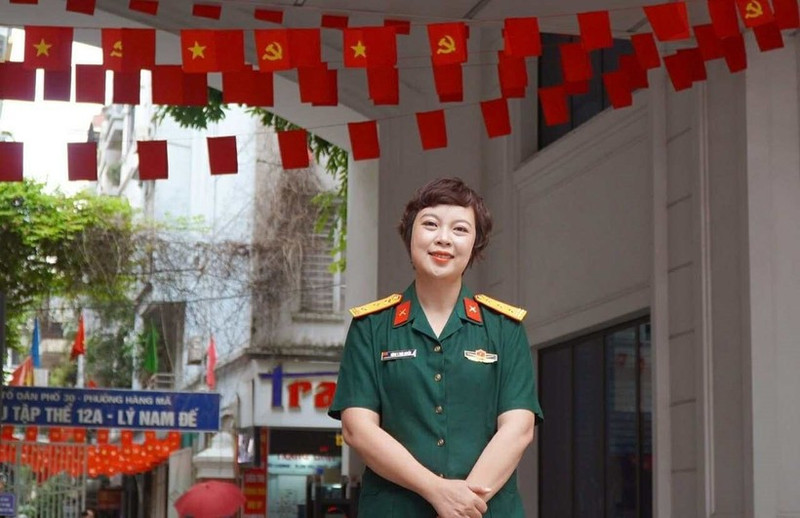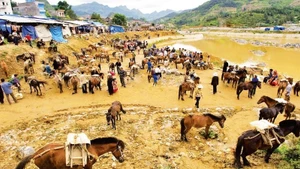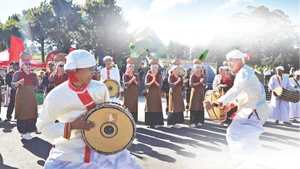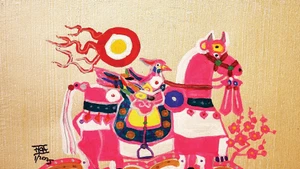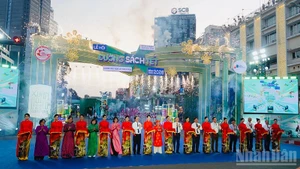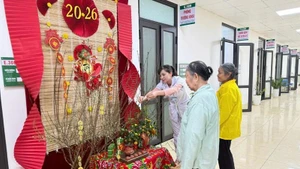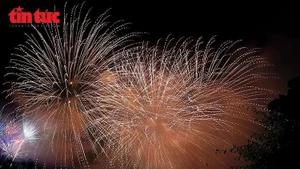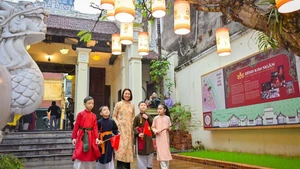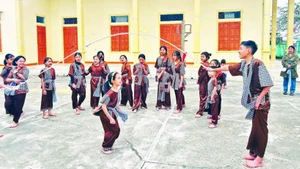The film is inspired by the heroic and steadfast 81 days and nights of fighting by the officers, soldiers, and people defending the Quang Tri Ancient Citadel in 1972.
Director, Meritorious Artist Dang Thai Huyen, granted an interview to Thoi Nay (Present Day), a publication of Nhan Dan (People) Newspaper, sharing insights into the production of ‘Red Rain’.
There are pains that cannot be named
Question: After undergoing 81 days of filming and a long post-production process, now that ‘Red Rain’ is about to be released on a special national anniversary of the country, how do you feel?
Director, Meritorious Artist Dang Thai Huyen: Even during post-production, when watching the footage, I still asked myself: “How did my team and I manage to get through such a challenging journey?” We filmed for 81 days amid storms, smoke, and fire. There were moments when our strength was nearly exhausted, yet in the end, we completed it.
The day the film project was officially announced, at the end of July, was an unforgettable milestone for us. The emotions of the People’s Army Cinema collective and the film crew were not only happy but also profoundly proud because we had fulfilled the mission entrusted by the Central Military Commission, Ministry of Defence, and the leadership of the General Political Department.
Q: When you received the script from writer Chu Lai, what did you find most difficult, and what did you grasp most quickly to visualise the cinematic language of the film?
A: The most difficult was the “harshness” unique to Chu Lai’s literary style. Even a single sentence could become an expensive large-scale scene if adapted to the screen.
But what I clearly imagined from the start was that I did not want to tell a war story only through bombs and bullets.
I chose to tell it through silences, inner emotions, and suppressed pains. After a battle, while bombs and bullets ravage, amid moments of life and death, the audience can still feel the aspirations and love of the soldiers.
Q: How did you choose to tell the story to convey that spirit?
A: ‘Red Rain’ does not shy away from the brutal large-scale battle scenes nor from the sacrifices and losses on our side. It is time for young audiences to feel a part of the indescribable horrors and sorrows of war and to feel the tragic grandeur of the 81 days and nights battle at Quang Tri.
It is time for young audiences to feel a part of the indescribable horrors and sorrows of war and to feel the tragic grandeur of the 81 days and nights battle at Quang Tri.
But at the same time, I want viewers to see the silences behind the soldiers.
On the front line, they are extremely heroic soldiers, fighting selflessly for the country. But, in those moments when bombs paused, what was their inner life like? What did they want, think of, dream of? There are moments of reflection, moments of personal longing. That is what I want to capture on screen.
Q: Among the 81 days and nights of filming, which scene do you remember most?
A: It was the river crossing scene. That day, the water rose very strongly. The water current was so fierce that even though the actors had rehearsed, they couldn't control their bodies.
I had to stop filming to find another plan, but the team requested one last take. Their bodies had passed their limits, but they didn't give up.
After a 30-minute break, they went back into the water. And we were blessed enough to have a rare calm moment to complete this crucial scene. It was the third take. If we had continued, the actors would probably have fainted from the cold.
Making films about revolutionary war history is a mission
Q: The cast is mostly young people born in peacetime. How did you choose and work with them so they could act as soldiers in wartime?
A: My first criteria are their eyes and spirit. When a new actor enters the audition room, I will be convinced if I can catch a bright gaze, a resolute appearance, and a sincere soul. I need actors to carry the spirit, the character, like the ones stepping out from the script. I do not intend to choose stars for the movie.
Then, all actors go through months of rigorous military, physical, and martial arts training. Following that is half a month of test shooting, with a budget equivalent to a small-scale feature film, to assess adaptation skills. When filming officially begins, they are no longer actors; they have become soldiers.
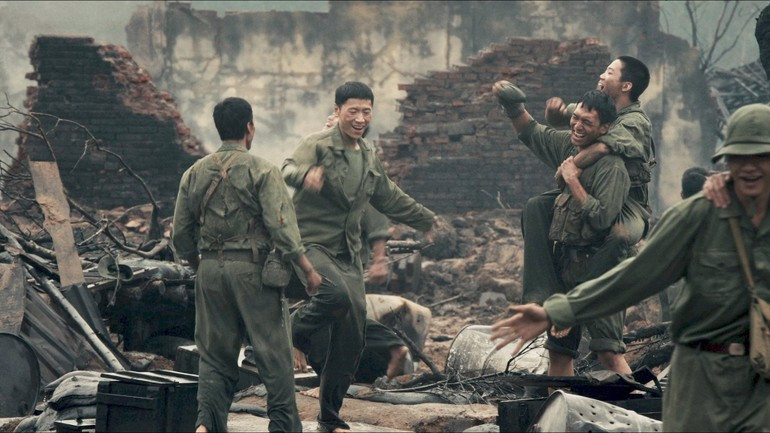
Q: Could you share about the cost of producing a war film? For example, how much smoke, fire, and explosives were used for ‘Red Rain’?
A: It is impossible to measure. In just the first two weeks, we had to request more explosives because the scene was too vast. Some large scenes required seven cameras, and we had to coordinate with pyrotechnic experts from Thailand and Vietnamese combat engineers. They performed their tasks very carefully and passionately.
Making war films is very challenging because large-scale battle scenes are needed, and staging actual combat is extremely costly. Filmmakers must prepare thoroughly over several years.
Q: Can you share with us about the filming at Quang Tri Ancient Citadel?
A: I feel the people of Quang Tri’s love for the nation’s heroic revolutionary history as well as their true support for the film crew
They knew the crew filmed at night, so they willingly turned off their outside lights and kept the area as quiet as possible, such as not singing karaoke at home.
Although their daily lives were disturbed by the noise of the set day and night during the filming, they wholeheartedly supported us. Many locals took part as extras.
Many even wrote handwritten letters to the crew, saying that it was the most beautiful memory of their lives when multiple generations of their family appeared in the film.
I want audiences to leave the cinema wanting to learn more about the “81 days and nights of the Ancient Citadel” and many other war stories of their ancestors, and to appreciate the peace they have now.
Q: In recent years, many Vietnamese films, including revolutionary war films, have attracted large audiences and created box office phenomena. How do you view this trend?
A: It’s an encouraging sign for the industry. More than a decade ago, everyone feared audiences would turn away from war films. But now, some historical films “break box office records” and audiences queue to buy tickets.
This reality shows that if invested meticulously and seriously, films about history and revolutionary war can fully reach a wide audience, especially young viewers. That creates huge motivation for producers and directors.
I know many producers are currently nurturing large projects. If everyone supports them, and each director contributes a helping hand, then revolutionary war cinema will advance further and be more widely welcomed by the public.
Q: What are your expectations for ‘Red Rain’’s box office revenue?
A: ‘Red Rain’ reflects only a slice of war; it cannot fully convey the cruelty of war, but if it stirs emotions, provokes a thought, or question, then for me, the film has fulfilled its mission.
I do not hide my wish for the film to be well received and commercially successful. But more than that, I want audiences to leave the cinema wanting to learn more about the “81 days and nights of the Ancient Citadel” and many other war stories of their ancestors, and to appreciate the peace they have now.
For me personally, making historical films is not just a task but a mission. I cherish every opportunity to work in this way.
Thank you for the conversation!
Director, Meritorious Artist Dang Thai Huyen is currently Deputy Director of the Viet Nam People’s Army Cinema. She is the director of several films and documentaries highly regarded by critics, such as ‘Nguoi Tro Ve’ (The Returnee),‘Loi Nguyen Gia Toc’ (The Family Curse), ’13 Ben Nuoc’ (13 Water Wharves), ‘Mat Bien’ (Sea Eyes), and ‘De Lai Mua Xuan’ (Leaving the Spring).
‘Thirteen Water Wharves’ won six golden lotus awards at the 16th Việt Nam National Film Festival, including for Best Director.
